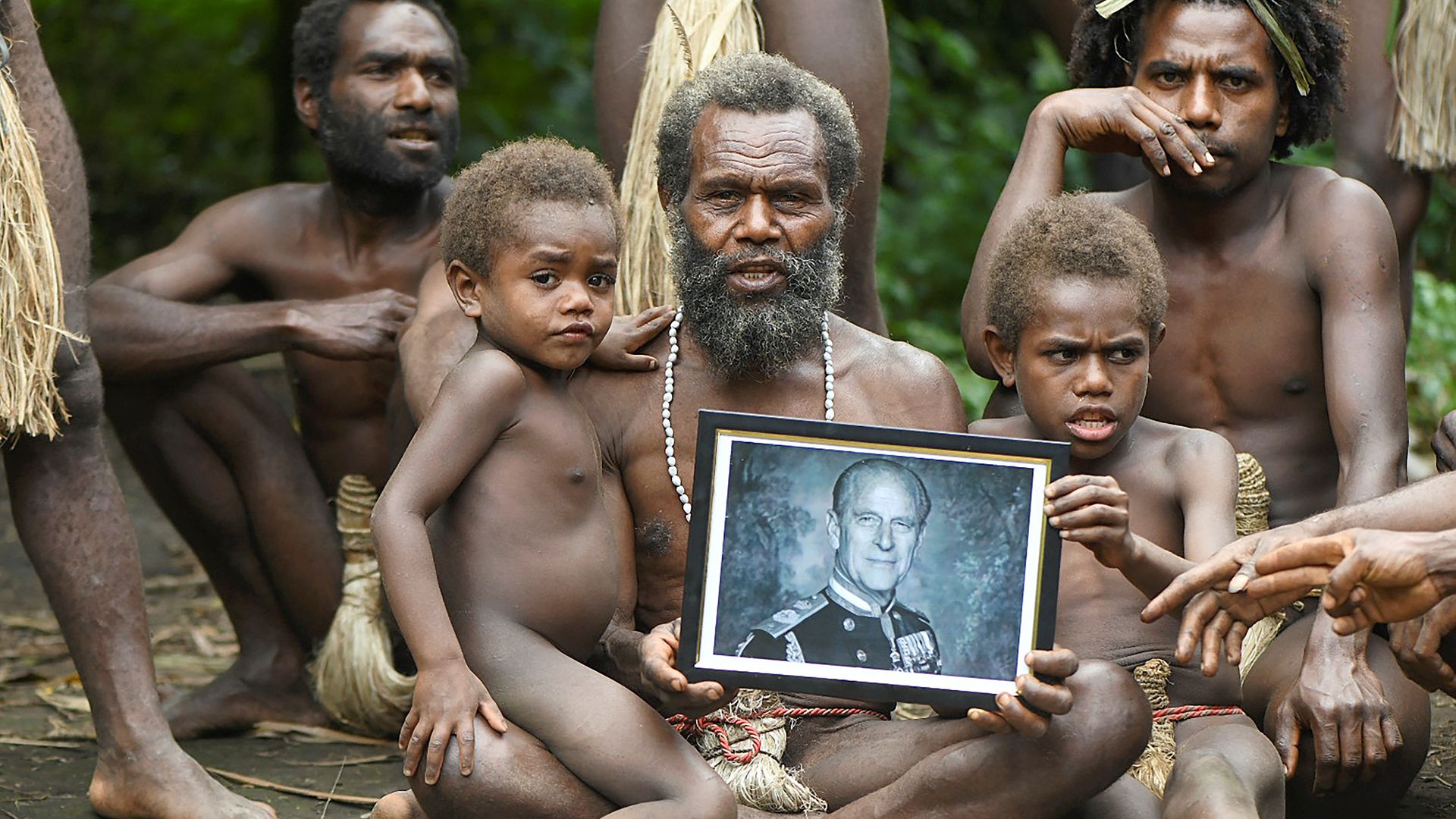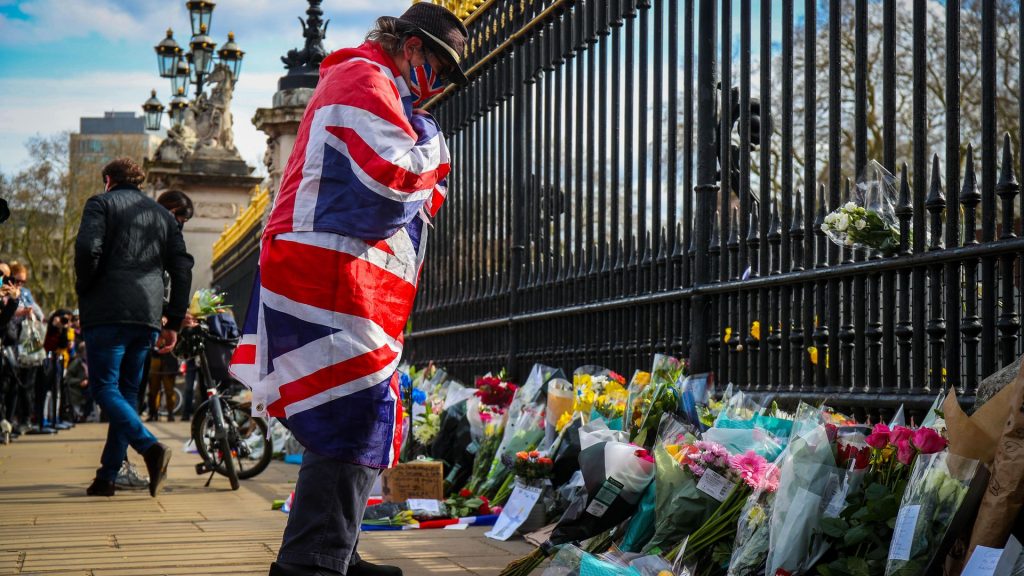
Will Self looks at the differences between the mourning for Princess Diana and Prince Philip – and the Vanuatu tribe who worshipped the Duke of Edinburgh
To Buck House, to check out how the collective hysteria was manifesting itself in the wake of Phil the Greek’s demise. There were cut flowers lined up along barriers that had been specially erected – but we’re talking a couple of hundred bouquets, not the great berms of moribund blooms and cellophane that self-erected in the hours after Diana Spencer’s death.
That phenomenon I remember only too well: in those days I was still a gregarious party animal, and heard the news of hers and Dodi Fayed’s crash in the Pont de l’Alma underpass as l got back around 3am from the West End fleshpots. My late wife was heavily pregnant at the time with our eldest son – but she was a consummate newswoman, so I woke her up.
We spent the long day that followed monitoring the increasingly febrile atmosphere via the news networks – then, as dusk was falling, decided to visit Kensington Palace, where the scenes had a bizarrely apocalyptic feel, as if Hieronymus Bosch had been called upon to design a stand for the Chelsea Flower Show. There were those berms of cut-flowers to begin with – while in the overpoweringly sickly-sweet darkness, large crowds of hysterical people wheeled around the Round Pond. Every conversation you tuned into was a threnody: The poor woman… the poor little princes… the poor Queen…
But in the immediate aftermath of the Duke of Edinburgh’s death the hysteria seems to’ve been confined to the airwaves rather than perfuming a substantial portion of London’s air as every senior pundit in the land scrambled on air to opine and bloviate, while the BBC cleared its schedules across all channels – a move that led to accusations of it being little more than a North-Korean-style state broadcaster.
In the real world, there was the virus to begin with: the official death notice was removed within an hour from the Palace railings less it become sort of cynosure, while statements were made to the effect that the last thing the deceased would’ve wanted was any excess emotion or gatherings that might spread the contagion. In 1997 the contagion was hysteria – now the threat of Covid acted in some mysterious homeopathic way to counter any such mass outpouring of grief. Or did it?
A more balanced view is that the Duke was a very old man, his time had come, and while a dignified sadness and sympathy for his widow were indeed appropriate, there was no call for any histrionics. There were signs up at the Palace requesting that floral tributes not be left – and that if they were, they’d be removed on a regular basis.

I knelt to read some of the notes attached to these doubly ephemeral memorials: “I hope you can see and reflect back on all the things you have done for this country and us,” read one in biro on a sheet of lined paper torn from an exercise book; while another urged: “Rest in peace, Sir,” as if the Duke’s famous energy was likely to make nailing the coffin lid shut problematic. A pattern was emerging – confirmed by another neatly lettered note: “Thank you for your years of service for your country. May your family find peace and comfort in Jesus at this time.”
The pattern being a firm belief in the afterlife among the note-leavers, and an assured conviction that HRH was both en route to getting wings rather than pitchforks, and would be able to receive these valedictions. There’s a close affinity here between Christian monarchists and tribal animists. Since his death, some commentators have wondered whether the remote tribe on Vanuatu in the South Pacific, who worship Prince Philip as a god may have to reboot their pantheon now that he’s no longer incarnate. However, this represents a cultural confusion on these Britons’ part – one that I’d argue also applies to their understanding of themselves.
The members of the so-called ‘Prince Philip Movement’ fitted the Queen’s consort into a metaphysics loosely conformable with other South Pacific cargo cults: he was a great warrior; he had disappeared across the sea and would return with a white wife and all sorts of material gifts for the islanders. Kirk Huffman, an Australian anthropologist, told reporters that the Prince’s death would probably be marked by ceremonies in which kava – a mild analgesic/hallucinogen – will be imbibed so as to connect his worshippers with the world beyond.
This all sounds uncannily like the Church of England to me; whose communicants also believe that the Duke was a great warrior rendered divine by marriage to a white woman. Here, the Duke’s tremendous age already constituted a sort of provisional immortality; while, as pundit after obituarist pointed out, his status as a great moderniser – flying planes, making television broadcasts, telling British workers to pull their f***ing fingers out – rendered him an entirely plausible version of one of those mythical figures (‘John Frum’ or ‘Tom Navy’), who South Sea islanders believe will return to share with them their own great material wealth.
Of course, misty-eyed over their bitter and sherry, the domestic members of the Prince Philip Movement may descry something else through the mystic portal. Huffman observes that the Vanuatuans have no real belief in the British monarchy per se – so it’s by no means a forgone conclusion that they will transfer their loyalty to any other member of the Royal family, such as Prince Charles.
What do you think? Have your say on this and more by emailing letters@theneweuropean.co.uk
Warning: Illegal string offset 'link_id' in /mnt/storage/stage/www/wp-includes/bookmark.php on line 357
Notice: Trying to get property 'link_id' of non-object in /mnt/storage/stage/www/wp-includes/bookmark.php on line 37







